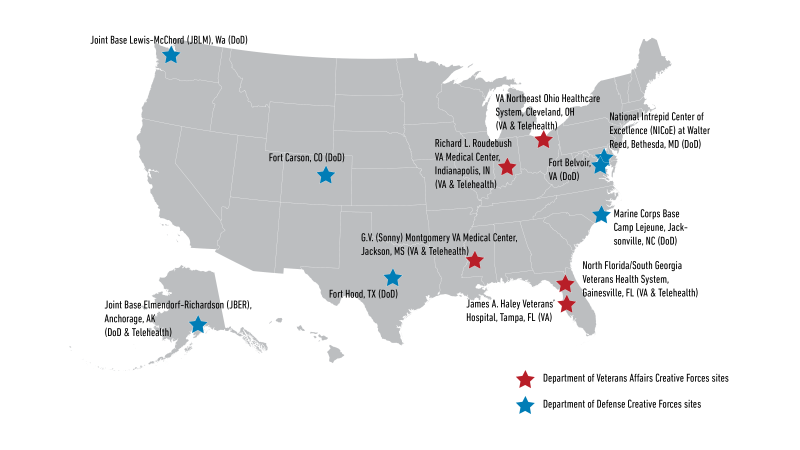Creative Forces: Clinical Program
Creative arts therapies like art therapy, dance/movement therapy, and music therapy can promote rehabilitation and recovery for military-connected people, making a difference in their lives.
The Clinical Program embeds creative arts therapies in military healthcare settings across the country, including through telehealth.
Our team also influences the broader healthcare system by advancing research, practice, and policy.
Clinical Program Impact
Since 2012, Creative Forces has placed creative arts therapists (CATs) at military hospitals and veterans’ facilities, where they have provided creative arts therapies to military-connected people and their families. Clinical Program reach (as of Dec. 2024)
- 25,063 patients have received care at Creative Forces Clinical Program sites since 2017.
- 141,214 therapy encounters led by Creative Forces creative arts therapists.
- 32 creative arts therapists work with patients and families at 12 Creative Forces clinical sites.
Learn more about our clinical research
Watch videos from the Creative Forces: Healing the Invisible Wounds of War online exhibit
About Creative Arts Therapies
Creative arts therapies can help people achieve optimal physical and mental health, resilience, social integration, and quality of life.
Creative arts therapies help patients:
- Process emotions and traumatic experiences
- Increase self-awareness and self-esteem
- Reduce hyperarousal, avoidance, and depression
- Decrease social isolation
Creative arts therapies also address cognition, motor, speech/language functioning, and chronic pain.
Creative arts therapists
Through the Creative Forces Clinical Program, creative arts therapists, known as CATs, provide creative arts therapies for military and veteran patients. Therapies are provided in clinical settings at Department of Defense (DoD) and Veterans Affairs (VA) medical facilities and through telehealth.
Creative Forces CATs are employees of the DoD, VA, or the Henry M. Jackson Foundation for the Advancement of Military Medicine, Inc. (HJF).
Patient-centered care
Creative Forces places creative arts therapies at the core of patient-centered care. This means CATs work on interdisciplinary teams in treatment programs that focus on supporting each patient’s unique needs.
Watch our Clinical Program overview video
Meet some of the Clinical Program team, as they discuss key aspects of their work with patients.

Creative Forces Clinical SitesThese are the Creative Forces clinical sites in alphabetical order by state.
|

